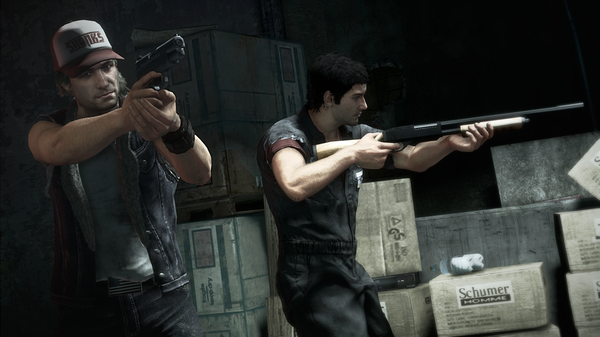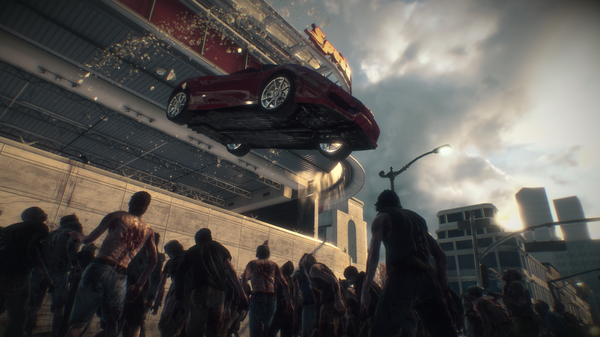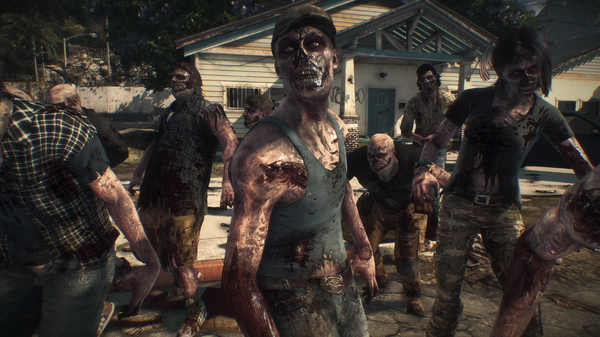
14 Questions about working in the games industry
Apr 12, 2016 // Jeffery Simspon
At Capcom Vancouver we get a lot of people asking how to break into the video game industry. From the outside it may seem an insurmountable task at times and yet clearly it happens. Someone has to be making all of these video games. Zombie AI doesn’t write itself.
Unless it does, and that’s a frightening thought.
Recently we received an email from Lukas, a grade 10 student at Abby Secondary in Abbotsford British Columbia, asking us 14 questions for a career planning course. We passed the questions to a few different people in the studio and decided to share their answers here.
Jason Buchwitz, Art Director
How did you get started in this occupation?
I’ve been an artist for as long as I can remember. My career in CG/gaming started 18 years ago by knowing someone in the online casino industry. They were impressed with my traditional art skills with drawing and painting and I was able to basically learn 3D modeling on the job.
What did you do to prepare for this occupation?
A life time of drawing and painting almost every single day and a passion for gaming ever since early childhood
What can I do to prepare for this occupation?
Try things. Don’t be afraid to fail. Find out what you’re REALLY good at which will line up with where your passion is. Practice, practice, practice and refine your skills. Learn how to present yourself and your work well. Never spread yourself thin by trying to be good at too many things.
What is the most important thing you learned during your formal training related to this occupation?
That I will never stop learning.
Knowing what you know now, would you choose the same job again?
Absolutely. I love what I do. I love being able to express my creativity on a daily basis and work with other amazing creative people.
What skills are necessary for this occupation?
It all depends on what discipline you want to go for. A passion for games and collaborating with creative people is a good place to start.
Describe what you do in a typical day.
As an Art Director, much of my time is spent with the art team on the floor and in formal art reviews providing feedback and direction. Managing the art teams and collaborating with the design and technology groups make up a typical day. When I’m not on the floor, I can be found at my desk establishing the art vision for the game so that any feedback and direction I provide comes from a solid foundation.
What do you like the most about your occupation? The least?
I like working with incredibly creative people the most. The least would be anything that takes me away from this.
What type of people do you work with?
Highly creative and passionate people!
What is your company trying to accomplish?
We want to continue to establish ourselves as an industry leading AAA game development studio.
What advice would you give to a young person entering this occupation?
Don’t be silent. Take advantage of the experienced people surrounding you to learn and grow in your career.
Can you tell me what the job outlook is for this occupation?
Game development is here to stay. Rapid innovation in our industry combined with highly creative people pushing the envelope all point to a very exciting future.
What changes have occurred in this occupation?
As mentioned above, so much innovation has occurred in the last 30+ years. Tools for building games are becoming more and more accessible. Take advantage of this.
Can you recommend any other information about this occupation?
Because of the accessibility of game development tools and online tutorials, take the time to learn them. The only limiting factor here is yourself:)

Steve Pearce, Software Engineer
How did you get started in this occupation?
I think I got really lucky. I was finishing up a Master’s degree in computer science focusing on document recognition type stuff. I sent resumes out all over Ontario but the job market was a bit dry.
I had only sent one resume out to a game company, and that was EA in Burnaby. It was a bit of a pipe dream, I grew up in a small community with the thought that the tech industry was mostly for banks and Universities, and my resume reflected that, it was pretty standard, and very dry. I had no idea what the video game industry was like. I started to get really excited about the idea of making games, and after not hearing back from EA for a week, I followed up to show my enthusiasm. I happened to catch the recruiter at just the right time, he replied back within an hour, and I replied right back. After an initial phone screen on a Friday afternoon, I got feedback that I seemed like a good candidate, but that I just didn’t seem interested enough in games.
I spent that night re-doing my resume ( while my roommate was throwing a party ), and sent the recruiter a new one that was basically a character profile from a game I made up. Education became intellectual guilds, experience became quests completed, and goals became quests. He called back Monday and asked when I wanted to fly out for a real interview.
What did you do to prepare for this occupation?
Nothing specific in the years leading up to it. I tried hard in school and got good grades. When the time came for my first interview, I played all the games that had been mentioned to me. Coming in prepared is so important, and shows you’re willing to spend the extra time just in case it’s important.
What can I do to prepare for this occupation?
These days there are a lot more options at school. Learning something about all aspects in that setting can be a huge advantage, AI, rendering, and systems are particularly important. If you want to work on consoles or mobile, you should also learn a bit about hardware because it actually makes a difference. Efficient code can look different on different hardware architecture.
What is the most important thing you learned during your formal training related to this occupation?
The most important thing you can ever learn is how to learn. There is no way you can anticipate the challenges you’ll be faced with, so being able to find your own answers is the key to success.
Knowing what you know now, would you choose the same job again?
Yes. There are always days when the challenges seem like they can crush you, but the first time your friends play your game and think it’s awesome, it’s all worth it.
What skills are necessary for this occupation?
There are so many different roles on a video game team, that any and all skills are valuable. In general, you need to be smart enough to solve challenging problems, and patient enough not to get overly frustrated when plans change. You have to be able to communicate ideas with people of all different backgrounds. On any given day you may be talking AI with a designer that has never built a state machine, acting out animation sequences with an animator, and talking low level cpu performance with other engineers.
Describe what you do in a typical day.
My current role is a game play lead, so I currently oversee about 10 game play engineers. So I spend my day doing all sorts of different tasks. I may attend feature meetings, where I work with designers to figure out what our game is, what our engine can do, and how we can take advantage of that. I’ll do the same with engineers, but it’s more technical and we talk about coding patterns, and bugs to look out for. The other aspect of my job is to help with planning and scheduling, and trying to make sure we can achieve what we set out to do.
My previous role, was as an AI engineer. I would spend my entire day thinking like a zombie. I worked on pretty much every aspect of the AI and game play. Some days I’d work on perception, so that zombies could detect the NPCs and lures, and other days I’d work on individual behaviours, and what animations they would play. Near the end of a project, there is always a period of optimization and bug fixing, where things became a lot more technical, and I would be worrying about cache misses, and efficient algorithms.
What do you like the most about your occupation? The least?
What I like most is that I get to be creative. I spend just as much time talking about what a zombie or NPC would do, as I do making it happen. We are successful if things are fun. What I like least are the crunch times. In any industry there are deadlines you have to hit, but with games, we all want to do the best job possible, and sometimes that can mean putting in some extra time to make adjustments that weren’t planned for. I think those times are a lot like studying for finals, where it doesn’t matter how much you know, you always want to know more to get a better grade.
What type of people do you work with?
All types of people. There are visual artists, animators, audio artists, designers, engineers, and managers. Each discipline draws a different kind of person, with different skill sets and backgrounds. Engineers tend to be more technical, and like math. An animator has likely never heard of a quadratic equation. But, despite all the differences, we are all working towards a common goal, and we all get along.
What is your company trying to accomplish?
As a company we want to make great games that people want to play.
What advice would you give to a young person entering this occupation?
Study hard, but don’t be just a student. In the entertainment industry you have to keep up to date on what the trends are. I like to play other games and think about how they’ve solved, or avoided some problems. For engineering you have to be well rounded, and know about hardware and algorithms. Taking some art or rendering courses never hurts either, because it’s all things you’ll hear about at work and you will understand more what people are trying to say. Being passionate about something you want to accomplish is always a bonus too, if you want to do AI, come with a plan of how you would make the best ever partner AI.
Can you tell me what the job outlook is for this occupation?
I think the outlook is really good. There are always jobs open with the bigger companies, and smaller studios start up all the time. It’s even possible to make a good living totally independently.
What changes have occurred in this occupation?
The technology has changed quite a bit in the last 10 years. There are always new generations of consoles coming out, and online games have become a really big deal. Smaller mobile studios are also a relatively new thing.
Can you recommend any other information about this occupation?
Not really, it’s very diverse. If you want to be an engineer, it’s all about problem solving, math, and skill at programming. Make sure you research the studios and technology you’re targeting, and brush up on anything you think might be helpful. When I interview candidates, it shows a lot if they’ve played or at least watched videos of the games we make. Coming to Capcom, and talking about Halo won’t get you as far as talking about Dead Rising .

Jeffery Simpson, Community Manager
How did you get started in this occupation?
My background in writing helped and I had also been working in customer service for a cellular carrier and so those skills directly translated over to dealing with fans online. I also was a fan of the studio’s first game and had been immersed in fan culture myself so I knew how to talk to fans.
What did you do to prepare for this occupation?
I went to the University of British Columbia with and came out of it with a degree in History and a minor in English. While that doesn’t seem directly applicable it taught me critical thinking and how to write well. I then spent over a decade in various jobs dealing with the public and doing customer service, from working at McDonald’s in high school to a movie theatre and on. Each job taught me how to talk with customers, how to respond to complaints and how to make people happy when something goes wrong.
What can I do to prepare for this occupation?
Learn to write clearly and in an entertaining fashion. Learn about and use social media. Be a fan of things and let that passion show. Studios want to hire people who love games as Community Managers because they’re the people who get the fans exciting about what’s next.
What is the most important thing you learned during your formal training related to this occupation?
There was never much formal training for the role and every studio or publisher in the industry sees a Community Manager as a different thing. Probably the best thing I learned was back in my old cellular customer service job and that’s the importance to people of being heard and having their feelings acknowledged. I’m not always going to be able to do everything people want, but it’s powerful to be able to say, “I understand why you’re upset and let’s see how we can make it right.”
Knowing what you know now, would you choose the same job again?
I think I’d like to have studied computer science. The people on the technical side of the industry seem to have the best job security and getting to be so key to the creation of games would be exciting. But that doesn’t mean I’ve got any regrets, this is pretty much the best job a History Major could ask for in the industry.
What skills are necessary for this occupation?
Writing. Reading. Listening. Also a thick skin, people on the Internet can say some pretty strong things and sometimes I get to be the target of misplaced anger.
Describe what you do in a typical day.
I typically post something on our social media channels in the morning, and monitor how that performs through the day. For each post I study what worked and what didn’t so that the next day’s post will be even better. I do a lot of writing, check our studio’s incoming email and read what people are saying about us and our games online. There’s a lot of variety, some days it’s all blog writing and other days I’m walking around interviewing people in the studio for a video we’re making.
Then there’s the times I get to go to exciting events like E3 in LA or Gamescom in Cologne Germany. While those are a lot of work, it’s an incredible time and maybe my favourite thing about the job.
What do you like the most about your occupation? The least?
Apart from getting to go to events like E3 I love being able to talk with fans who are passionate about games. And while I don’t make the games myself, being a part of the teams that do is really exciting. The worst part is probably when I know some exciting news but I have to keep it to myself.
What type of people do you work with?
Smart people. My first job in the industry was one of the first times that I felt like I was clearly the dumbest person in the room. And while I’m more confident of myself today than I was back then, it still shocks me how smart the people who make games are.
What is your company trying to accomplish?
To make great games. Games people love.
What advice would you give to a young person entering this occupation?
Always be honest. There’s going to be times when it might seem easier to say what people want to hear, and that will make them happy for awhile, but be honest and upfront with everyone. Sure you won’t be able to tell everyone everything, things have to stay secret in the industry at least until they’re announced, but be as honest as possible.
Can you tell me what the job outlook is for this occupation?
It’s limited. Every studio should have a Community Manager, or a few of them, but unlike a lot of other jobs there’s not a lot of open positions. At Capcom Vancouver I’m the first one they’ve had for a while now and that’s one job out of over 200 staff we have here. But if you’re good at what you do, opportunities will open up.
What changes have occurred in this occupation?
Live streaming video is much bigger than 6 years ago when I started. Twitch is a big deal now and being able to leverage that is important. There’s also a far greater focus on “influencers” which are people with large audiences on Twitter or Snapchat or another network who you want to say good things about your game. In a way that’s made a Community Manager much more a marketing type job than it used to be.
Can you recommend any other information about this occupation?
There’s a few books on it, but none that I’ve found that useful. A book about the power of crowds that I’d recommend is Clay Shirky’s Here Comes Everybody: The Power of Organizing Without Organizations that talks a lot about how information spreads on the internet and how things go viral. The Game evelopers Conference (GDC) has a website with videos of their past events and they have a lot of panels on Community topics, it’s worth taking a look there.

Dylan Hunter, Technical Artist
How did you get started in this occupation?
I always drew flipbooks in school, then in college, when I was becoming an engineer, I discovered 3D software and fell in love with it. Toy Story came out and showed me that it’s possible to get paid to do this, so I went to animation school in Vancouver and slowly worked my way into the industry, starting with TV cartoons.
What did you do to prepare for this occupation?
More than anything, I tried to maintain a good work ethic and maintain a passion for what I do, it is a labour of love and so so rewarding.
What can I do to prepare for this occupation?
Much like above, the most important thing is to constantly practice your art, working on your own stuff, and keep your passion full by staying up to date, and staying inspired by looking at what other people are doing. It’s important to keep our motivation in check.
What is the most important thing you learned during your formal training related to this occupation?
I would say it’s the need to leave my ego at the door and that it’s ok to make mistakes. Ultimately it’s all a group project to make the best possible game for our gamers through a combined effort, not my effort. Especially more artistic work, sometimes we wear our heart on our shoulders so to speak, but it’s never ever personal.
Knowing what you know now, would you choose the same job again?
Absolutely, in a heartbeat. I love waking up in the morning, getting to work early and I genuinely look forward to going to work. I feel blessed and fortunate to have a job I love to do; it can be tough at times and demanding, but I wouldn’t change it for anything.
What skills are necessary for this occupation?
So I started out as an animator, but I am now a technical artist. For myself, the ability to study weight and motion was hugely important, believe it or not, drawing is not a huge prerequisite. For the more technical stuff, those are skills I have built slowly over time through extracurricular courses and such; such as coding/scripting, and deeper use of 3D software like modelling, rigging, texturing, etc. Many of these you can learn at specialized schools. More than anything, it’s important to be able to built a network and be able to communicate, as well as just show a genuine passion.
Describe what you do in a typical day.
My days are pretty erratic, but will often involve taking models the artists have made, putting a skeleton in them to create a rig that is animatable and then weight the skin onto the bones. Then bring that into game and set up logic and state machines for the different animations to go through based on player choice. I’m kind of a jack of all trades right now though, so my daily tasks are really all over the place.
What do you like the most about your occupation? The least?
I love the people I work with and the fact that the work itself is genuinely gratifying. I least like the corporate humdrum tasks that have to be done as part of it though (eg. emails, logging work and tasks, etc)
What type of people do you work with?
I work with people of all walks of life and ages, which is great, but everyone I work with loves games and seem to embrace their inner nerds.
What is your company trying to accomplish?
Capcom (Vancouver) in particular is a studio that is really trying to embrace a healthy work culture and environment; they really seem bent on making people happy and want to stay, which is refreshing in this industry at times. They want to make the best quality games we can, but make them efficiently and take in creative ideas and initiative from all the employees, I think that is really cool. Myself, as an example, I did a sideways transition from animator to Tech Artist and Capcom fully supported that move.
What advice would you give to a young person entering this occupation?
All it takes is tenacity; landing your first job is going to be the hardest, but don’t ever give up. Networking is important, but showing that you are constantly improving is even moreso. It only takes one yes out of a hundred nos.
Can you tell me what the job outlook is for this occupation?
Good, very good. There is a lack of sound Technical Artists out there. Partly because it is left and right brained work, but they will always be useful, as it’s not really a job that is outsourceable. There will always be jobs for animators as well.
What changes have occurred in this occupation?
Mostly it’s just keeping up with technology. I’ve noticed as a TA, I have to ramp up on new tech and ideas faster than others, because artists come to me for answers so I better have them. Tech can change so fast, it’s actually pretty exciting at the same time.
Can you recommend any other information about this occupation?
If you go the route of animation, I highly recommend animationmentor.com, not only do you get taught by seasoned professionals, but they also instill and build a great sense of community, which is super helpful for keeping that passion strong and building that community and network. Becoming a tech artist isn’t something that happens straight out of school, but consider taking additional courses in programming, life drawing, etc, what ever you find interesting. Never give up on your dreams and they won’t give up on you.
-
Brands:Tags:
-

Loading...
Platforms:
